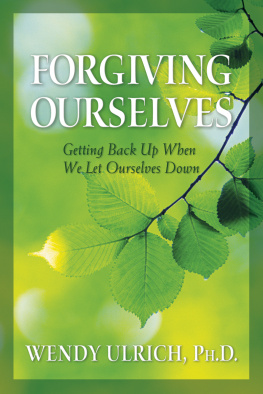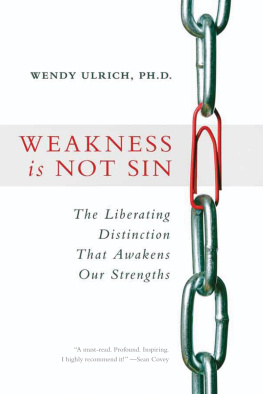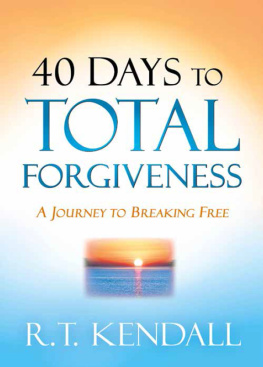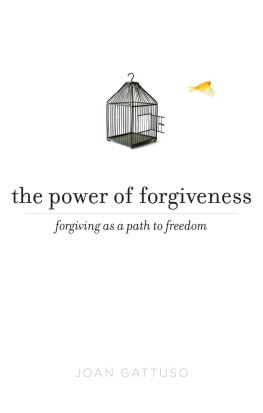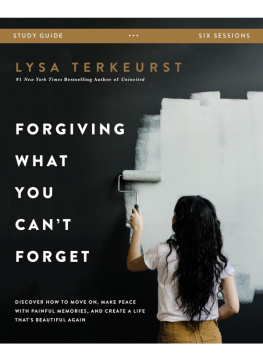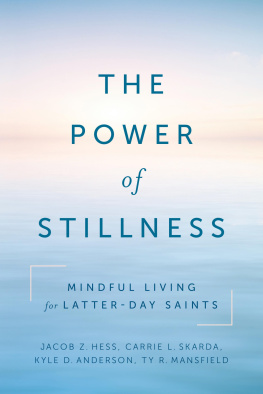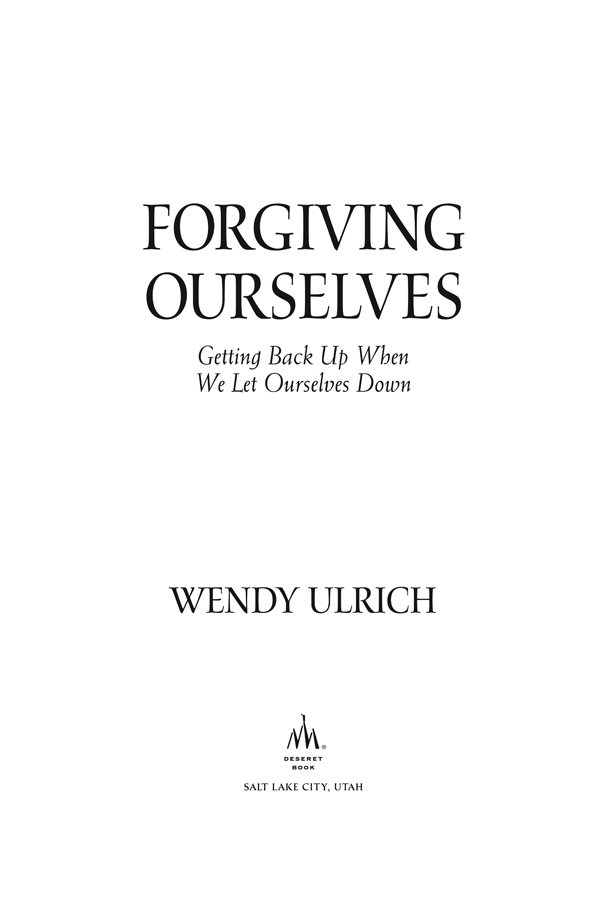2008 Wendy Ulrich.
All rights reserved. No part of this book may be reproduced in any form or by any means without permission in writing from the publisher, Deseret Book Company, P.O. Box 30178, Salt Lake City Utah 30178. This work is not an official publication of The Church of Jesus Christ of Latter-day Saints. The views expressed herein are the responsibility of the author and do not necessarily represent the position of the Church or of Deseret Book. Deseret Book is a registered trademark of Deseret Book Company.
Ulrich, Wendy.
Forgivingourselves : getting back up when we let ourselves down / Wendy Ulrich.
p.cm.
Includesbibliographical references and index.
ISBN-13:978-1-59038-857-0 (pbk.)
1.Self-acceptanceReligious aspectsChristianity. 2. ForgivenessReligiousaspectsChristianity.
3.Church of Jesus Christ of Latter-day SaintsDoctrines. 4. Mormon ChurchDoctrines. I. Title.
BV4647.S43U472008
234'.5dc22
2007048475
Printed in the United States of America
R. R. Donnelley and Sons, Crawfordsville, IN
10 9 8 7 6 5 4 3 2 1
For Dave
Plus quhier,moins que demain
Introduction
The Challenge
Thereis a mighty power of healing in Christ, and... if we are to be histrue servants, we must not only exercise that healing power in behalf ofothers, but, perhaps more important, inwardly.
President Gordon B. Hinckley
You might remember the story: During afamine, God sends Elijah to a widow for sustenance. The widow ruefully tellsthe prophet that she is preparing to cook the last of her food for herself andher son before they die. Elijah asks her to share with him, promising that ifshe does she will never lack for oil or grain. As pledged, she has enough tolast through all the years of famine.
But the story takes a bitter turn. Despite the miracle ofthe bottomless barrel and cruse, the widows son becomes ill and dies.Grappling with this wrenching loss she says to Elijah, What have I to do withthee, O thou man of God? art thou come unto me to call my sin to remembrance,and to slay my son? (1 Kings 17:18).
Thats how it often works, isnt it? We get by, try to dowhats right, cope with lifes challenges. But should something happen tosomeone we love, should our good fortune turn sour, suddenly it gets personal:So this is about my sin, isnt it? Here is my failure coming back to haunt me.This is my punishment at last. We dont know what sin vexed the widow in thestory (whose son Elijah soon restored to life), but we know intimately the sins,failures, mistakes, and frailties that vex us, challenging our claim topeace.
Although Latter-day Saints are among the bestpeople I know, they are also among the most self-critical. Too oftenwe work hard to improve and repent and then fail to fully claim the amazinggrace of Jesus Christ. As one individual noted about a goodLatter-day Saint friend, She would take responsibility for war inthe Middle East if she could figure out how.
As a psychologist and as a Church member, Ive struggled tohelp clients, missionaries, friends, and colleagues let go of excessiveself-blame and like themselves again. I too have spent many hours inthat dark night of the soul that is haunted by the ghosts of my lesser self.This book attempts to map the journey from self-blame toself-forgiveness for fellow travelers, as well as for the bishops,therapists, family members, and friends who support us.
An Overview
While our repentance ensures Gods forgiveness, we need morethan repentance to forgive ourselves. We also need accurate assumptions aboutthe purpose of life and the place of sin and failure. We need to make sense ofour past, fix our relationships with other people, and understand howself-forgiveness feels. We may need to update our beliefs about howto stay safe, change our expectations of ourselves, or get off theteeter-totter of shame and pride. We might need spiritual and psychologicalhealing, not just behavior modification, before we can fully receive all thatthe Savior offers. This process of claiming Gods and our own forgiveness canbe summarized in four concepts that loosely organize this book: (1) clarifying our beliefs, (2) qualifying for forgiveness and grace, (3) overcoming internal obstacles to peace, and (4) trusting God.
Part 1 of this book, Clarifying Our Beliefs, will reviewkey elements of the plan of salvation (chapter 1), defineself-forgiveness (chapter 2), and explore waysself-forgiveness can be an act of righteous living that benefitsothers as well as ourselves (chapter 3).
Part 2, Qualifying for Forgiveness, helps us understandwhen repentance is called for (chapter 4) and reviews the steps of repentance(chapter 5), including changing behavior, making restitution, apologizingeffectively, rebuilding trust, and forgiving others.
Having repented, we may still bog down in excessiveself-recrimination because of unhealthy personality styles ordifficult experiences from our past. Part 3, Overcoming Internal Obstacles toPeace, looks at excessive shame or pride (chapter 6), depression (chapter 7), obsessive-compulsive,or perfectionist, tendencies (chapter 8), resentment andself-destructive unselfishness (chapter 9), and the effects of abuseor trauma (chapter 10). This section will help us see how self-blamegives the illusion of working for us while it hurts us in the long run.
Part 4, Trusting God, reminds us that even when our sinsare serious (chapter 11) or hurt those we love the very most, such as ourchildren (chapter 12), the Atonement can bring us peace. Chapter 13concludes with suggestions for exercising agency to truly choose God as our Godby deciding to trust His capacity to love and forgive us.
What to Expect
So is there really light at the end of the dark tunnel ofregret? I believe that no matter who we are or what weve done, we can obtainpeace, self-acceptance, and release from the bondage ofself-accusation. But the climactic moments of Gods forgiveness described in scripturalaccounts do not necessarily reflect theday-in-and-day-out experience of self-forgiveness.Even Alma and Paul speak ruefully of their past sins, suggesting that momentsof sadness, shame, even grief over past failings can still recur after God hasforgiven us and our repentance is complete. Certainly we can expect greaterpeace, more realistic self-assessments, more enduring hope than whatwe felt when we first faced our sinful state. But even doctrinal clarity, fullrepentance, and hard psychological labor will not always provide completefreedom from regret over past sins or shame about not overcoming currentweaknesses.
More realistic goals for the habituallyself-blaming might be:
that our self-recrimination becomeless severe, less easily triggered, less all-defining, and lessunrelenting;
that we access more hope in the midst of ourdiscouragement, more reassurance of our real worth despite periodic feelings ofworthlessness;
that our trust in Gods gentle mercy becomea brighter beacon in the recurring darkness of the mortal journey;
that we see the temptation to despair aboutourselves as just that, a temptation, rather than as a realistic response towho we truly are;
that we respond to that temptation with clearthinking, honest prayer, bids for support, realistic efforts to learn and grow,courageous acceptance of our limitations, and deeper trust in Gods willand power to save us.
Not everyone will find permanent freedom from bouts ofself-condemnation or anxiety about Judgment Day. We can, however,learn to talk back to our fears with sound doctrine and more balancedself-perspectives, rather than letting our fears take over without afight. We can learn to more

